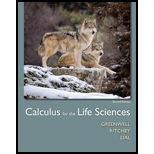Solutions for Calculus For The Life Sciences
Problem 1PSDT:
What percent of 50 is 10?Problem 2PSDT:
Simplify 13725.Problem 3PSDT:
Let x be the number of apples and y be the number of oranges. Write the following statement as an...Problem 4PSDT:
Let s be the number of students and p be the number of professors. Write the following statement as...Problem 5PSDT:
Solve for k:7k+8=4(3k).Problem 6PSDT:
Solve for x:58x+116x=1116+x.Problem 7PSDT:
Write in interval notation: 2x5.Problem 9PSDT:
Solve for y:5(y2)+17y+8.Problem 10PSDT:
Solve for p:23(5p3)34(2p+1).Problem 11PSDT:
Carry out the operations and simplify: (5y26y4)2(3y25y+1).Problem 12PSDT:
Multiply out and simplify (x22x+3)(x+1).Problem 13PSDT:
Multiply out and simplify (a2b)2.Problem 16PSDT:
Perform the operation and simplify:a26aa24a2a.Problem 17PSDT:
Perform the operation and simplify:x+3x21+2x2+x.Problem 18PSDT:
Solve for x:3x2+4x=1.Problem 19PSDT:
Solve for z:8zz+32.Problem 20PSDT:
Simplify 41(x2y3)2x2y5.Problem 22PSDT:
Simplify as a single term without negative exponents: k1m1.Problem 23PSDT:
Factor (x2+1)1/2(x+2)+3(x2+1)1/2.Problem 24PSDT:
Simplify 64b63.Problem 25PSDT:
Rationalize the denominator: 2410.Problem 26PSDT:
Simplify y210y+25.Browse All Chapters of This Textbook
Chapter P - Prerequisite Skills Diagnostic TestChapter R.1 - PolynomialsChapter R.2 - FactoringChapter R.3 - Rational ExpressionsChapter R.4 - EquationsChapter R.5 - InequalitiesChapter R.6 - ExponentsChapter R.7 - RadicalsChapter 1.1 - Lines And Linear FunctionsChapter 1.2 - The Least Square Line
Chapter 1.3 - Properties Of FunctionsChapter 1.4 - Quadratic Functions; Translation And ReflectionChapter 1.5 - Polynomial And Rational FunctionsChapter 1.CR - Chapter 1 ReviewChapter 1.EA - Extended Application Using Extrapolation To Predict Life ExpectancyChapter 2.1 - Exponential FunctionsChapter 2.2 - Logarithmic FunctionsChapter 2.3 - Applications: Growth And DecayChapter 2.4 - Trigonometric FunctionsChapter 2.CR - Chapter 2 ReviewChapter 2.EA - Extended Application Power FunctionsChapter 3.1 - LimitsChapter 3.2 - ContinuityChapter 3.3 - Rates Of ChangeChapter 3.4 - Definition Of The DerivativeChapter 3.5 - Graphical DifferentiationChapter 3.CR - Chapter 3 ReviewChapter 3.EA - Extended Application A Model For Drugs Administered IntravenouslyChapter 4.1 - Techniques For Finding DerivativesChapter 4.2 - Derivatives Of Products And QuotientsChapter 4.3 - The Chain RuleChapter 4.4 - Derivatives Of Exponential FunctionsChapter 4.5 - Derivatives Of Logarithmic FunctionsChapter 4.6 - Derivatives Of Trigonometric FunctionsChapter 4.CR - Chapter 4 ReviewChapter 4.EA - Extended Application Managing Renewable ResourcesChapter 5.1 - Increasing And Decreasing FunctionsChapter 5.2 - Relative ExtremaChapter 5.3 - Higher Derivatives, Concavity, And The Second Derivative TestChapter 5.4 - Curve SketchingChapter 5.CR - Chapter 5 ReviewChapter 5.EA - Extended Application A Drug Concentration Model For Orally Administered MedicationsChapter 6.1 - Absolute ExtremaChapter 6.2 - Applications Of ExtremaChapter 6.3 - Implicit DifferentiationChapter 6.4 - Related RatesChapter 6.5 - Differentials: Linear ApproximationChapter 6.CR - Chapter 6 ReviewChapter 6.EA - Extended Application A Total Cost Model For A Traning ProgramChapter 7.1 - AntiderivativesChapter 7.2 - SubstitutionChapter 7.3 - Area And The Definite IntegralChapter 7.4 - The Fundamental Theorem Of CalculusChapter 7.5 - The Area Between Two CurvesChapter 7.CR - Chapter 7 ReviewChapter 7.EA - Extended Application Estimating Depletion Dates For MineralsChapter 8.1 - Numerical IntegrationChapter 8.2 - Integration By PartsChapter 8.3 - Volume And Average ValueChapter 8.4 - Improper IntegralsChapter 8.CR - Chapter 8 ReviewChapter 8.EA - Extended Application Flow SystemsChapter 9.1 - Functions Of Several VariablesChapter 9.2 - Partial DerivativesChapter 9.3 - Maxima And MinimaChapter 9.4 - Total Differentials And ApproximationsChapter 9.5 - Double IntegralsChapter 9.CR - Chapter 9 ReviewChapter 9.EA - Extended Application Optimization For A PredatorChapter 10.1 - Solution Of Linear SystemsChapter 10.2 - Addition And Subtraction Of MatricesChapter 10.3 - Multiplication Of MatricesChapter 10.4 - Matrix InversesChapter 10.5 - Eigenvalues And EigenvectorsChapter 10.CR - Chapter 10 ReviewChapter 10.EA - Extended Application ContagionChapter 11.1 - Solutions Of Elementary And Separable Differential EquationsChapter 11.2 - Linear First-order Differential EquationsChapter 11.3 - Euler's MethodChapter 11.4 - Linear Systems Of Differential EquationsChapter 11.5 - Nonlinear Systems Of Differential EquationsChapter 11.6 - Applications Of Differential EquationsChapter 11.CR - Chapter 11 ReviewChapter 11.EA - Extended Application Pollution Of The Great LakesChapter 12.1 - SetsChapter 12.2 - Introduction To ProbabilityChapter 12.3 - Conditional Probability; Independent Events; Bayes' TheoremChapter 12.4 - Discrete Random Variables; Applications To Decision MakingChapter 12.CR - Chapter 12 ReviewChapter 12.EA - Extended Application Medical DiagnosisChapter 13.1 - Continuous Probability ModelsChapter 13.2 - Expected Value And Variance Of Continuous Random VariablesChapter 13.3 - Special Probability Density FunctionsChapter 13.CR - Chapter 13 ReviewChapter 14.1 - SequencesChapter 14.2 - Equilibrium PointsChapter 14.3 - Determining StabilityChapter 14.CR - Chapter 14 Review
Book Details
Calculus for the Life Sciences features interesting, relevant applications that motivate students and highlight the utility of mathematics for the life sciences. This edition also features new ways to engage students with the material, such as Your Turn exercises.
Sample Solutions for this Textbook
We offer sample solutions for Calculus For The Life Sciences homework problems. See examples below:
Chapter P, Problem 1PSDTChapter R.7, Problem 1YTGiven: The data is given by, Year of Birth Life Expectancy (years) 1970 74.7 1975 76.6 1980 77.4...Chapter 2.EA, Problem 1EAChapter 3.EA, Problem 1EAChapter 4.EA, Problem 1EAGiven: The given conditions are: CM(t)=1.99De−0.14t−1.62De−2.08t and 500−mg dose is given every 12...Chapter 6.EA, Problem 1EAApproach: Write equation for the rate of consumption of minerals at time t. Use the property of...
More Editions of This Book
Corresponding editions of this textbook are also available below:
Calculus for the Life Sciences Books a la Carte Edition (2nd Edition)
2nd Edition
ISBN: 9780321964434
Student's Solutions Manual for Calculus for the Life Sciences (2nd Edition)
2nd Edition
ISBN: 9780321963833
Calculus for the Life Sciences Plus MyLab Math with Pearson etext -- Access Card Package (2nd Edition)
2nd Edition
ISBN: 9780321964380
CALCULUS F/LIFE SCIENCES F/PENN STAT
2nd Edition
ISBN: 9781323177617
Pearson eText for Calculus for the Life Sciences -- Instant Access (Pearson+)
2nd Edition
ISBN: 9780137553457
Calculus for the Life Sciences Books a la Carte Plus MyLab Math Access Card Package (2nd Edition)
2nd Edition
ISBN: 9780321964540
EBK CALCULUS FOR THE LIFE SCIENCES
2nd Edition
ISBN: 9780321964458
MYMLAB & ETEXT CALCULUS FOR LIFE SCI PS
2nd Edition
ISBN: 9781323178317
Related Calculus Textbooks with Solutions
Still sussing out bartleby
Check out a sample textbook solution.
